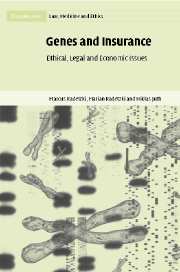8 - Conclusions and policy implications
Published online by Cambridge University Press: 29 July 2009
Summary
Introduction
We have now reached the end of the road in our review of the questions that arise as a consequence of the partial dismantling of the traditional social insurance systems and of the simultaneous advances of genetic science, along with the potential usefulness of genetic insights for the insurance industry. The purpose of this chapter is to provide a background to the regulation in force in many countries constraining the possibilities of using genetic insights for the purpose of insurance (section 8.2), to summarise the arguments for and against this regulation (section 8.3), and, importantly, to discuss whether regulation really serves its purpose, or if other action is needed to resolve the emerging and potential problems caused by the above confluence of events (section 8.4).
Initially, however, it is important to provide a reminder of a central starting point for our work. Insurance to provide protection against income shortfalls during illness, in the event of premature death, and during old age, in all cases up to a level at which reasonable comfort can be assured, provides a utility of vital importance to the individual's welfare. There are strong reasons, both economic and ethical, in favour of the view that everyone should be assured access to such a utility. Our work would lose much of its justification if this starting point were invalid.
Our approach is forward looking; in this respect it differs from the static views that characterise part of the literature on which our study is based.
- Type
- Chapter
- Information
- Genes and InsuranceEthical, Legal and Economic Issues, pp. 141 - 152Publisher: Cambridge University PressPrint publication year: 2003

